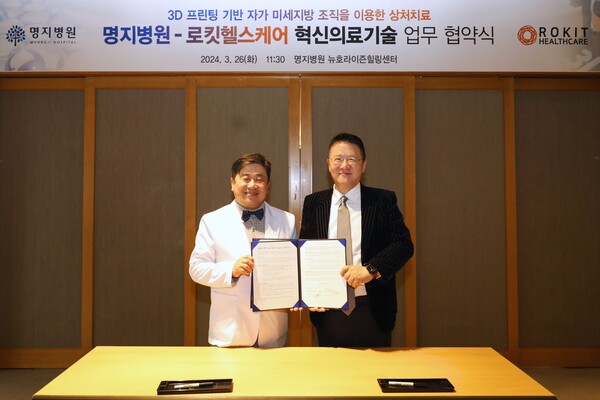Myongji Hospital and Rokit Healthcare, a company specializing in organ regeneration, have agreed to join forces to research and develop diabetic foot treatment technology using 3D bioprinting.

Myongji Hospital President Kim Jin-goo and Rokit Healthcare Chairman and CEO You Seok-hwan signed the agreement at the hospital in Goyang, Gyeonggi Province, on Tuesday. Dr. Lee Seung-yeol, director of the hospital’s Orthopedic Surgery Department, Professor Kim Woo-seop, Rokit Healthcare President Kim Ji-hee, and Director Park Dong-il also attended the ceremony.
Under the agreement, Myongji Hospital will use Rokit Healthcare's 3D bioprinting technology to regenerate skin tissue to verify the safety and efficacy of treating skin ulcers and necrosis caused by diabetic foot disease, the hospital said Wednesday.
Besides, the two organizations agreed to continue developing technology based on their know-how, such as Myongji Hospital's rich clinical experience and Rokit Healthcare's technological capabilities, and work together on related tasks requiring cooperation.
In particular, Myongji Hospital plans to make multifaceted efforts to improve treatment effectiveness by linking with the hospital's hyperbaric oxygen treatment center and promoting hyperbaric oxygen treatment, which has been proven effective in treating diabetic feet.
Diabetic foot disease is caused by decreased blood circulation, sensation, and immune system in diabetic patients. It is characterized by neuropathy, structural deformation, infection, and vascular disease. In severe cases, it can develop into necrosis, where the skin rots, so it is necessary to provide sufficient blood supply to the toes and regenerate the skin in case of necrosis.
The 3D bioprinting technology used in this joint research uses living cells and biomaterials to create human organ tissue. The National Evidence-based Healthcare Collaborating Agency selected it as an innovative medical technology.
The technology has the advantage of customizing skin tissues needed to treat diabetic feet or chronic wounds for each patient, making it harmless to the body while increasing treatment effectiveness.
"The combination of Rokit Healthcare's regenerative medicine technology and Myongji Hospital's rich clinical experience will enable us to provide advanced medical services to patients," Rokit Healthcare Chairman You said.
Myongji Hospital President Kim Jin-goo said, “Myungji Hospital has been striving to treat diabetic feet through the close collaboration of orthopedics, endocrinology, and hyperbaric oxygen therapy centers. By incorporating Rokit Healthcare's 3D bioprinting technology, we will work together to improve treatment effectiveness and enhance synergy between the two institutions."

